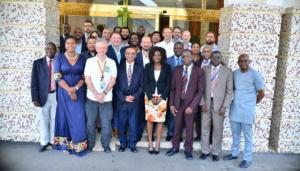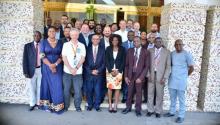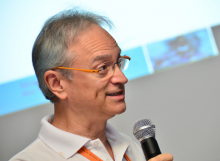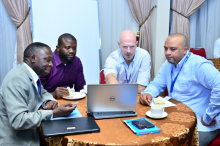WHO Evaluates Health Sector Emergency Humanitarian Response in North Eastern Nigeria
Abuja, 03 December 2016- The World Health Organization (WHO) country office in Nigeria has reviewed the progress made and lessons learnt from the health sector response for humanitarian emergency in the northeast states of Nigeria after four months of scaling up operations in the region affected with insurgency. The 2-day review workshop was aimed at making adjustments and instituting corrective measures for the next two months based on lessons learned.
Speaking in Abuja on 30 November, 2016, Dr Jorge Castilla, Senior Emergency Officer at WHO Headquarters in Geneva mentioned that “the review allows WHO to make choices against scarce resources. It also allows for the disbursement of available resources to priority areas as it allows to adjust the staff organogram for the next 8 weeks and provides opportunity for introducing longer term elements in terms of enlargement of coverage to other states and support for the longer term programme. It also confirms the grading of the response”.
Following the declaration that the humanitarian situation needed an internal Grade 3 Emergency response in August 2016, an Incident Management
System was activated to involve the surge capacity in the response at all the 3 levels of the organization. With the surge capacity, WHO has expanded the scope of its field operational presence with a full-scale humanitarian operation in northeastern Nigeria. The emergency response hub is in Maiduguri, Borno state, the epicenter of the crisis.
The successful military operations at the beginning of 2016 resulted in liberating communities which were hitherto under the insurgents’ control about 800,000 people were released and currently living in 15 satellite camps outside Maiduguri metropolis. Assessments conducted from the onset showed that the newly liberated population is in dire need of humanitarian assistance including health services.
Dr Jorge who noted both internal and external teething problems of the response agreed that “after having seen the place Maiduguri and meeting the team, I am convinced that our action is useful and correct but as WHO, we have to deliver, build on our insights so far garnered on how to best respond”. He disclosed some of the residual challenges of the response to include inaccessibility in some priority areas needing health sector response and high staff attrition and delays in institutional funding for service delivery.
In different groupings, participants explored innovative mechanisms to deliver services in areas with difficult access given the realities of inaccessibility in Borno state. Consequently, the workshop fine-tuned the response strategies which included essential health services, coordination, surveillance and outbreak response as well operations support to restore existing health facilities and make them effective.
The review meeting in Abuja which was also attended by participants from the WHO Nigeria country office and northeast zonal and Africa Regional offices as well and from the Headquarters, also crystalized the response framework and plans on ground in order to address the expectations of beneficiaries and reduce mortality ratios which remained above the expected threshold levels.
________________________________________
For more information, please contact:
Technical contact:
Dr Mary Stephen; Tel: +234 803 639 1332; Email: %20%20%20stephenm [at] who.int ( stephenm[at]who[dot]int)
Media contact:
Ms Charity Warigon; Tel: +234 810 221 0093; Email: %20%20%20%20warigonc [at] who.int ( warigonc[at]who[dot]int)
_______________________________________
01 Group picture after the review in Abuja
02 Dr Jorge Castilla speaking during the review workshop
03 Group work during review workshop






